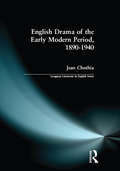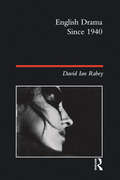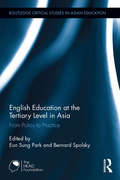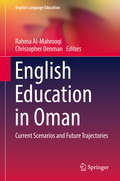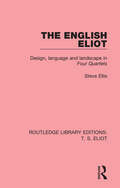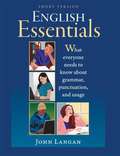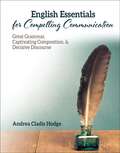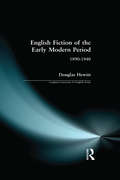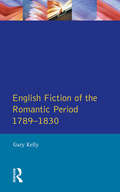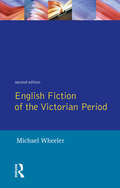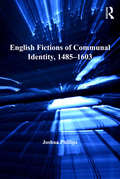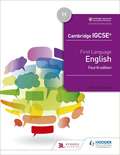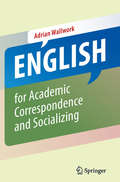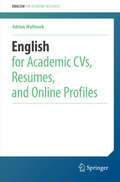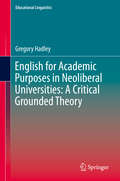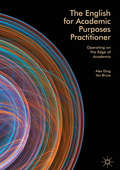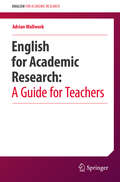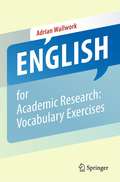- Table View
- List View
English Drama of the Early Modern Period 1890-1940 (Longman Literature In English Series)
by Jean ChothiaThe period 1890-1940 was a particularly rich and influential phase in the development of modern English theatre: the age of Wilde and Shaw and a generation of influential actors and managers from Irving and Terry to Guilgud and Olivier.Jean Chothia's study is in two parts beginning with a portrait of the period, setting the narrative context and considering the dramatic social and cultural changes at work during this time. It then focuses on some of the main themes in the theatre, from Shaw and comedy, to the rise of political and radio drama, providing an interpretative framework for the period. This volume will be of great benefit to students and academics of English literature and drama, as it covers the work of the major dramatists of the period as well as considering the dramatic output of literary figures, such as James, Eliot and Lawrence.
English Drama Since 1940 (Longman Literature In English Series)
by David Ian RabeyEnglish Drama Since 1940 considers the bids of successive post-war dramatists to find language and images of remorseless disclosure, appropriate to the public manifestation of sensed crisis and the interrogation of the ideal of renewal. This book introduces the period and its discourse whilst redefining them, to give proper consideration to developments of themes, styles, concerns and contexts from the 80s to the present. The book offers succinct and analytical introductions to the work of 60 dramatists, whilst arguing for (re)appraisal of many dates critical perspectives, in order to stimulate further argument in the field.
English Education at the Tertiary Level in Asia: From Policy to Practice (Routledge Critical Studies in Asian Education)
by Eun Sung Park Bernard SpolskyThis is the third volume of a trilogy on English Language education in Asia within the Routledge Critical Studies in Asian Education. Put together by editors and contributors selected by Asia TEFL, this book provides a timely and critical review of the current trends in tertiary level English education in Asia. It foregrounds the developments and trends, policies and implementation, as well as research and practice. Written by ELT scholars and educational leaders, this book presents articles on China, Hong Kong, India, Japan, Korea, Malaysia, the Philippines, Singapore, Thailand, and Vietnam. While the authors focus on their own local issues, providing an overview of the state of tertiary English teaching in their respective territories, they also provide insights from their successes and failures which can help inspire solutions to similar challenges faced internationally in the field. Chapters in the book include: • Heading toward the global standardization of English education in Korean universities • English in tertiary education in India: A Janus-faced perspective with special reference to University of Delhi • Developing English language skills in the Singapore higher education context • ELT at tertiary institutions in China: A developmental perspective This book will be valued by administrators, researchers and scholars interested in bilingualism, language policy and planning in higher education.
English Education in Oman: Current Scenarios and Future Trajectories (English Language Education #15)
by Rahma Al-Mahrooqi Christopher DenmanThis book explores an area that has been somewhat overlooked in the literature to date – the current status and future trends of English education in Oman. It offers a variety of theoretical and methodological approaches to the subject and explores areas of English education in Oman that have, until now, been little investigated. It explores these issues from a variety of perspectives: the professionalization of English teachers in the country; the implementation of novel teaching methodologies, curricula, and assessment approaches, into what are, in many ways, still very traditional education settings; the integration of learner identity into English language instruction; country- and culture-specific concerns with conducting research with Omani participants; the strategic demands of building stronger links between education and workforce needs; and developing learner autonomy and motivation.
The English Eliot: Design, Language and Landscape in Four Quartets (Routledge Library Editions: T. S. Eliot #Vol. 3)
by Steve EllisThis book, first published in 1991, supplies a neglected cultural context for T. S. Eliot’s writings of the 1930s and 1940s, particularly Four Quartets, and attempts to disprove the widespread belief in Eliot’s unproblematic commitment to England, and the ‘Englishness’. The book traces Eliot’s classicism not only in linguistic and formalist terms but also in his construction of England in the Quartets and Quartets-related essays. His practice is related to the vigorous polemic concerning the definition of England found in the 1930s and 1940s, in material as diverse as landscape painting, advertising, travel literature and the detective novel. This original and provocative text will not only be of interest to students and teachers of Eliot, but to those interested in representations of nationality.
English Essentials: Short Version
by John LanganWhat everyone needs to know about grammar, punctuation, and usage -- College
English Essentials
by John Langan Beth JohnsonIn the words of the text's best-selling author, John Langan, "Grammar books can be really dull. But they don't have to be. English Essentials is a new text that makes grammar, punctuation, and usage interesting--with pictures, stories, and activities students will enjoy. " The affordable price, ease of use, and simple, familiar language distinguish this engaging text from others on the market.
English Essentials for Compelling Communication: Great Grammar, Captivating Composition, & Decisive Discourse
by Andrea Cladis HodgeThis book was written for entry-level college freshman needing a comprehensive review of how to both use and understand the English language while gaining sufficient written and oral skills needed to excel in all other college courses. As a foundational learning tool, students can use this book to practice grammar, grow their lexicon, improve their reading levels, and work toward overall mastery of the English language. The content of the instruction in this book employs a scaffolding format so it works best to use this book in the order in which it is written. However, if more focused topical learning is desired, please use the table of contents to direct your selected usage of this book.
English Fiction of the Early Modern Period: 1890-1940 (Longman Literature In English Series)
by Douglas HewittThis is an ambitious and fascinating analysis of early twentieth-century English literature from Kipling, Conrad, Lawrence and Forster through figures like Joyce and Woolf to writers such as Evelyn Waugh. There are chapters on the younger writers of the age as well as the more popular minor writers like Buchan and Dornford Yates.
English Fiction of the Romantic Period 1789-1830 (Longman Literature In English Series)
by Gary KellyEnglish Fiction of the Romantic Period 1789-1830 is the first comprehensive historical survey of fiction from that period for many decades. It combines a clear awareness of the period's social history with recent developments in literary criticism, theory and history, and explains the astounding variety of forms in Romantic fiction in terms of the various cultural, political, social, regional and gender conflicts of the time. It provides a broad-ranging survey from the major authors and works through to the sub-genres of the period. Jan Austin and Sir Alter Scott are discussed alongside the Gothic Romance, political and feminist fiction, social satire and regional, rural and historical novels. It also provides a comparison of the methods of distribution and marketing and the availability of books then and now; examines cheap popular fiction and children's fiction, and considers the recent debate about the place of prose fiction in a Romantic literature hitherto dominated by poetry.
English Fiction of the Victorian Period (Longman Literature In English Series)
by Michael WheelerProfessor Wheeler's widely-acclaimed survey of the nineteenth-century fiction covers both the major writers and their works and encompasses the genres and "minor" fiction of the period. This excellent introduction and reference source has been revised for this second edition to include new material on lesser-known writers and a comprehensively updated bibliography.
English Fictions of Communal Identity, 1485–1603
by Joshua PhillipsChallenging a long-standing trend that sees the Renaissance as the end of communal identity and constitutive group affiliation, author Joshua Phillips explores the perseverance of such affiliation throughout Tudor culture. Focusing on prose fiction from Malory's Morte Darthur through the works of Sir Philip Sidney and Thomas Nashe, this study explores the concept of collective agency and the extensive impact it had on English Renaissance culture. In contrast to studies devoted to the myth of early modern individuation, English Fictions of Communal Identity, 1485-1603 pays special attention to primary communities-monastic orders, printing house concerns, literary circles, and neighborhoods-that continued to generate a collective sense of identity. Ultimately, Phillips offers a new way of theorizing the relation between collaboration and identity. In terms of literary history, this study elucidates a significant aspect of novelistic discourse, even as it accounts for the institutional disregard of often brilliant works of early modern fiction.
English First Language - IGCSE
by John ReynoldsThe textbook by IGCSE for English inspires students with a new Theme-based approach while supporting them with practical advice and accessible explanations. It ensures full coverage of the latest Cambridge IGCSE first language English syllabus (0500/0990) with a fully updated student's book, written by an experienced author and examiner. It motivates students with engaging themes such as travel and exploration and people and community. Develop reading Comprehension, analysis and Evaluation with a variety of text types and genres, plus annotations to aid understanding. Improve writing skills with Model responses and teacher commentary, and establish a strong background in spelling, punctuation and grammar. Expand communication skills with advice on holding presentations and responding to questions confidently. Consolidate learning with activities and study tips, as well as extra questions, practice tests and answers to selected questions online.
English for Academic Correspondence and Socializing
by Adrian WallworkEnglish for Academic Correspondence and Socializing is the first ever book of its kind specifically written for researchers of all disciplines whose first language is not English. With easy-to-follow rules and tips, and with authentic examples taken from real emails, referee's reports and cover letters, you will learn how to: * use strategies for understanding native speakers of English * significantly improve your listening skills * organize one-to-one meetings * feel confident at social events * manage and participate in a successful conversation * write effective emails * review other people's manuscripts - formally and informally * reply effectively and constructively to referees' reports * write cover letters to editors * use the telephone and Skype * participate in (video) conference calls * exploit standard English phrases Other books in the series: English for Presentations at International Conferences English for Writing Research Papers English for Research: Usage, Style, and Grammar English for Academic Research: Grammar Exercises English for Academic Research: Vocabulary Exercises English for Academic Research: Writing Exercises
English for Academic CVs, Resumes, and Online Profiles (English for Academic Research)
by Adrian WallworkAre you a graduate, postgraduate or PhD student? Building a CV or profile can be difficult for anyone, but especially for those whose first language is not English. This book is essential for those looking to promote themselves in the academic community, and can be used both for self-study, as well as in an English for Academic Purposes (EAP) course. The book contains tips, do's and dont's, and discussion points that can be used by instructors. Based on interviews with recruiters and an analysis of hundreds of CVs from around 40 different countries, the book is structured as a series of FAQs. Topics covered include: how recruiters and HR people analyse a CV whether using a template is a good idea how to present your personal details and whether to include a photo how to write an Objective and a personal profile what to write in each section (Education, Work Experience, Skills, Personal Interests) how to highlight your language, communication and team skills how to get and write references The last chapter of the book contains a simple template to help you get the job of your dreams! Other books in this series include: English for Writing Research Papers English for Research: Usage, Style, and Grammar English for Presentations at International Conferences English for Academic Research: Grammar / Vocabulary / Writing Exercises English for Academic Correspondence English for Interacting on Campus Adrian Wallwork is the author of over 40 books aimed at helping non-native English speakers to communicate more effectively in English. He has published with SpringerNature, Oxford University Press, Cambridge University Press, Scholastic, BEP and the BBC.
English for Academic Purposes in Neoliberal Universities: A Critical Grounded Theory
by Gregory HadleyThe critical grounded theory presented in this book offers valuable insights on the social processes and strategies used by Blended English for Academic Purposes Professionals (BLEAPs) at higher education institutions, as they struggle to negotiate the challenges arising from a new focus on recruiting international students and hunting for other resources for their universities. Drawing from in-depth interviews with numerous research participants at over eleven higher educational institutions in the UK, Japan and the United States, this work focuses on those who have been precariously placed as middle manager at many EAP and TESOL programs. Lacking in both positional power or permanence, these 'BLEAPs' are faced with many challenges as they seek to understand their changing role in higher educational institutions, and engage in strategies that can help them gain greater control over issues in their profession.
The English for Academic Purposes Practitioner
by Alex Ding Ian BruceThis book contextualizes the field of English for Academic Purposes (EAP), with a particular focus on the professional and academic identity and role of the EAP practitioner. The authors examine previously neglected areas such as the socio-economic, academic and employment contexts within which EAP practitioners function. In doing so, they develop a better understanding of the roles, expectations and constraints that arise from these contexts, which in turn shape professional practice and the identity of the practitioner. As EAP is emerging as an academic discipline with a growing body of published research, this book will appeal to trainee and established practitioners, along with researchers and students of linguistics and education.
English for Academic Research: A Guide for Teachers
by Adrian WallworkScientific English is possibly the most rewarding area of EFL teaching. It differs from English for Academic Purposes (EAP) as it is directed to a much smaller audience: PhD and postdoc students. Courses on Scientific English are held in universities throughout the world, yet there is very little support for teachers in understanding what to teach and how to teach it. This guide is part of the English for Academic Research series. Part 1 of the book sheds light on the world of academia, the writing of research papers, and the role of journal editors and reviewers. Part 2 gives practical suggestions on how to help your students improve their presentation skills. In Part 3 you will learn how to teach academic skills using nonacademic examples. Parts 1-3 are thus useful for anyone involved in teaching academic English, whether they have used the other books in the series or not. Part 4 suggests two syllabuses for teaching writing and presenting skills, based on the two core books: English for Writing Research Papers English for Presentations at International Conferences This book will help you i) understand the world of your students (i. e. academic research), ii) plan courses, and iii) exploit the What's the Buzz? sections in the books on Writing, Presentations, Correspondence and Interacting on Campus. Adrian Wallwork has written over 30 books covering General English (Cambridge University Press, Scholastic), Business English (Oxford University Press), and Scientific English (Springer). He has trained several thousand PhD students from all over the world to write and present their research. Adrian also runs a scientific editing service: English for Academics (E4AC).
English for Academic Research: Vocabulary Exercises
by Adrian WallworkThis book is based on a study of referees' reports and letters from journal editors on reasons why papers written by non-native researchers are rejected due to problems with English (long sentences, redundancy, poor structure etc). It draws on English-related errors from around 5000 papers written by non-native authors, around 3000 emails, 500 abstracts by PhD students, and over 1000 hours of teaching researchers how to write and present research papers. The exercises are organized into nine chapters on: adjectives and adverbs (e.g. actual vs current, different vs several, continually vs continuously), link words (e.g. on the contrary vs on the other hand, despite vs nevertheless), nouns (e.g. danger vs hazard, measure vs measurement), prepositions (e.g. among vs between, in vs into, with vs within), verbs (e.g. check vs control, compose vs comprise, arise vs raise, exclude vs rule out), false friends and synonyms, spelling, useful phrases, emails Nearly all exercises require no actual writing but simply choosing between various options, thus facilitating self-study, e-reading and rapid progress. The exercises can also be integrated into English for Academic Purposes (EAP) and English for Special Purposes (ESP) courses at universities and research institutes. The book can be used in conjunction with the other exercise books in the series: English for Academic Research: Writing Exercises English for Academic Research: Grammar Exercises
